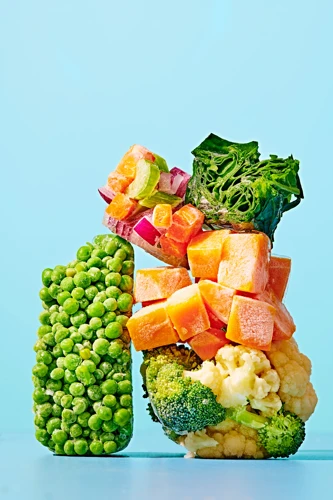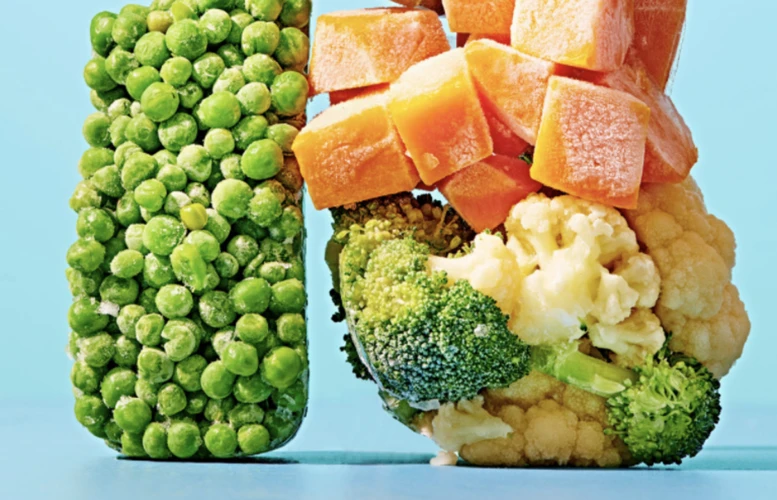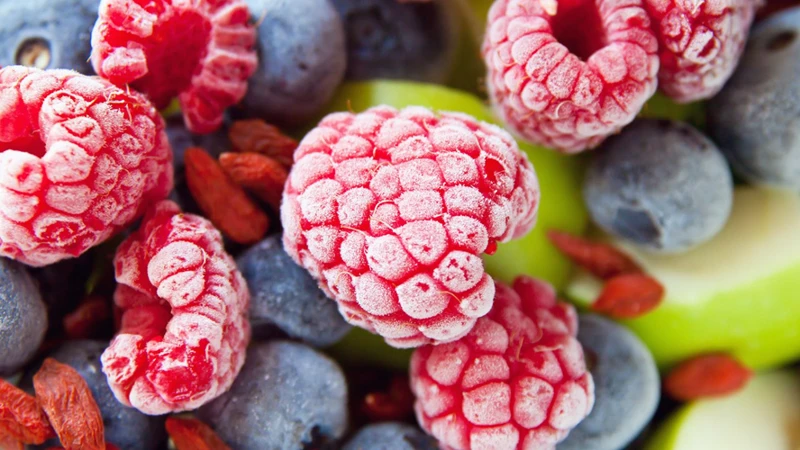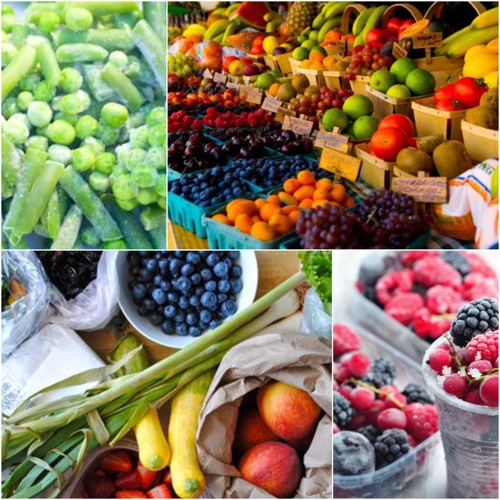As consumers, we’re often faced with the question of whether to buy fresh or frozen produce. Both options have their advantages and disadvantages. While fresh produce often has a reputation for being healthier, frozen produce has come a long way in recent years, offering convenience and year-round availability. With so many variables to consider, it can be perplexing to decide what to choose. In this article, we’ll compare the nutritional content, pros and cons, and factors to consider when choosing between fresh and frozen produce. We’ll also provide recommendations for both categories and cooking tips to make the most of your selection.
Defining Fresh and Frozen Produce
When it comes to choosing between fresh and frozen produce, it’s essential to understand what each term means. Fresh produce refers to fruits and vegetables that have been harvested from their source and have not undergone any kind of processing or preservation. Frozen produce, on the other hand, has been harvested and then processed through freezing, often within hours of being picked. Understanding the differences between these two types of produce is key to determining which one is better suited for your health and nutritional needs. To learn more about the nutritional content of fresh and frozen produce, read more by following this link.
Nutritional Content Comparison
Nutritional Content Comparison:
When it comes to the nutritional content of fruits and vegetables, there is an ongoing debate whether fresh or frozen produce is better. Both fresh and frozen fruits and vegetables have their own unique advantages, and choosing between them can be a tough call. Here’s a brief comparison of the nutritional content of fresh and frozen produce.
Fresh Produce:
– Fresh produce is usually harvested when it is ripe and at its peak of freshness.
– It is generally eaten raw or cooked within a few days of buying, making it a good source of vitamins and minerals.
– Some fruits and vegetables also lose their nutrients over time. For instance, vitamin C content can decrease rapidly after harvest, especially when exposed to light, heat, and air.
Frozen Produce:
– Frozen produce is harvested at its peak of ripeness and then flash-frozen to lock in nutrients.
– It retains its nutritional value for a longer period and is a good option when fresh produce is out of season or unavailable.
– Freezing can also destroy some harmful bacteria and parasites, making some foods safer to consume.
However, freezing can also cause some damage to the cell structure of fruits and vegetables, potentially impacting nutritional value. Additionally, some frozen fruits and vegetables may have added sugars or salt, reducing their nutritional value.
Both fresh and frozen produce can be a healthy addition to your diet. For optimal nutrition, it’s important to choose a variety of fruits and vegetables, both fresh and frozen. Check out our tips on creating a fruit and veg meal plan for more ideas on how to incorporate fresh and frozen produce into your diet.
Pros and Cons of Fresh Produce

Fresh produce is often touted as the epitome of healthy eating due to its wholesome, raw nature. However, is fresh always the best option? In this section, we will weigh the pros and cons of consuming fresh produce and uncover whether or not it truly lives up to its health halo. Nutritional content and other factors such as cost, seasonality, and convenience will be explored. By the end of this section, you’ll have a better understanding of why fresh produce can sometimes be the better option and sometimes not. If you want to learn more about nutrient-dense fruits and vegetables or ways to integrate them into your diet, check out this article or this guide.
Pros
When it comes to the pros of fresh produce, the first point to consider is the nutritional value. Fresh fruits and vegetables contain higher levels of vitamins and minerals than their frozen counterparts. They also have a higher water content, which makes them more hydrating and good for digestion. Another benefit of fresh produce is that it can have a better taste and texture when it’s in season and from a local source.
Fresh produce gives you the opportunity to inspect the produce for quality and ripeness before buying. This means that you can handpick the best fruits and vegetables, and choose those that are at peak ripeness. Additionally, consuming fresh produce can contribute to reducing the amount of waste in the household.
Lastly, fresh produce provides a sensory experience during cooking and eating. You can smell the fragrant herbs, admire the color of the fruits and vegetables, and enjoy the textures of the ingredients.
While there are many positives to buying fresh produce, there are also some downsides to consider. Fresh fruits and vegetables are more perishable than frozen produce, and they may have a shorter shelf life. Also, buying fresh produce can be more expensive depending on the season and the location.
To make the most of fresh produce, it’s important to know how to properly wash, store, and cook it. To learn more about these techniques, check out our guide on proper fruits and veggies washing and storing.
Cons
When it comes to cons of fresh produce, there are several points to consider.
- Higher Cost: Fresh fruits and vegetables can be expensive, especially when they are out of season. Additionally, some organic produce can be even more costly. To save money, you can opt for conventional produce or purchase frozen produce.
- Short Shelf-life: Fresh produce has a shorter lifespan than frozen produce. It can wilt, spoil, or develop mold within a few days, especially if not stored properly. This can result in waste and higher costs.
- Seasonality and Availability: Certain produce may not be available year-round, making it difficult to create a varied and balanced diet. It can also be challenging to find certain fruits and vegetables in some areas, especially if they are not grown locally.
- Lower Nutrient Value: The nutrient content of fresh produce can decrease if it is not stored properly or cooked using certain methods. For example, exposure to heat and air can cause certain vitamins to degrade. For the best nutritional value, it’s important to choose the right cooking methods for the specific produce you are using.
It’s important to note that many of these cons can be mitigated through careful planning and storage. By purchasing only what you need, storing produce properly, and choosing in-season options, you can help reduce food waste and lower your costs. Additionally, choosing organic produce can help address concerns about pesticide residue, as discussed in our article on organic vs. conventional produce.
Pros and Cons of Frozen Produce

When it comes to choosing produce that’s both healthy and convenient, frozen fruits and vegetables have become increasingly popular options. While frozen produce can offer several benefits, such as lower cost and longer shelf life, it’s important to weigh the pros and cons before making a decision. One study found that frozen produce can have comparable nutritional content to fresh produce, but there are other factors to consider beyond just the nutrient levels. Let’s take a closer look at the upsides and downsides of frozen produce. For tips on incorporating leafy greens into your diet, check out our article on 5 Healthy Ways to Eat Leafy Greens. And if you’re looking to up your fruit and vegetable intake, you might also be interested in our overview of the Benefits of Juicing and Blending.
Pros
When it comes to consuming fresh produce, there are several pros to consider. Here is a breakdown of these advantages in detail:
| Nutrient Density: | The nutritional content of fresh fruits and vegetables is generally considered to be superior to that of frozen produce. Fresh fruits and vegetables are packed with essential vitamins, minerals, and fiber. |
| Flavor and Texture: | Fresh produce can offer a more appetizing and vibrant range of textures, flavors, and colors. From the crisp snap of a fresh carrot to the sweetness of a juicy peach, fresh produce can deliver a more enjoyable eating experience. |
| Environmental Sustainability: | Choosing fresh produce that is locally grown and in-season may support sustainable agriculture practices and reduce the carbon footprint associated with produce transportation. |
| Customization: | When selecting fresh produce, you have the freedom to choose the exact amount, quality, and ripeness you want. This level of customization can allow for a more tailored culinary experience. |
While fresh produce may have some challenges with shelf life and convenience, the nutritional, flavor, and sustainability benefits can make it a valuable addition to any healthy diet.
Cons
Fresh produce, although fresh and tasty, also has its downsides. Here are the cons to keep in mind when using fresh fruits and vegetables:
| Short shelf life Fresh produce has a limited lifespan, especially when it is not stored properly. This can result in food waste and increased costs. It is important to consume fresh fruits and vegetables before they spoil or become less nutritious. |
| Seasonal availability Fresh produce is often seasonal, depending on where it is grown. This means that certain fruits and vegetables may be harder to find or more expensive during certain times of the year. This can limit the variety of produce available to consumers. |
| Frequent shopping required As fresh produce has a short shelf life, it requires frequent shopping trips to ensure a steady supply. This can be inconvenient for consumers who have a busy schedule or limited access to grocery stores. |
| Higher risk of contamination Compared to frozen produce that has been washed and packaged, fresh produce can carry a higher risk of contamination from bacteria, viruses and parasites. This is especially true if the produce is not washed or handled properly before consumption. |
| Not always as convenient to prepare Fresh fruits and vegetables require cleaning, peeling, chopping and cooking before they can be consumed. This can be time-consuming and may not be feasible for people with a busy lifestyle or limited access to kitchen facilities. |
Despite these drawbacks, fresh produce remains a popular and nutritious choice for individuals looking to maintain a healthy diet.
Factors to Consider in Choosing Fresh or Frozen Produce

When it comes to choosing between fresh and frozen produce, there are several factors to consider. Each option has its own set of advantages and drawbacks, and the decision ultimately depends on a variety of personal preferences and circumstances. From cost to convenience and seasonality, there are several factors that can influence your decision. Let’s explore some of the key factors to consider when deciding between fresh or frozen produce.
Cost
When it comes to cost, frozen produce is often the more affordable option. This is because it can be mass-produced, processed, and stored for longer periods of time. On the other hand, fresh produce tends to be more expensive due to its perishability and the extra costs associated with transportation, storage, and handling.
However, it’s important to note that some fresh produce items may be cheaper than their frozen counterparts, depending on factors like seasonality and availability. For example, when a certain fruit or vegetable is in season, its price may drop, making it more affordable than its frozen counterpart during that time.
The cost of fresh versus frozen produce can also vary depending on where you live and where you shop. While some grocery stores may offer lower prices for frozen produce, others may have better deals on fresh produce.
It’s important to consider your budget and weigh the cost differences between fresh and frozen produce. If you are working with a tight budget, frozen produce may be the more affordable option. However, if you have the means to splurge a bit or if certain fresh produce items are on sale, it may be worth it to go for the fresh option. Regardless of your choice, remember that both fresh and frozen produce can offer valuable nutritional benefits.
Convenience
When it comes to convenience, there is no doubt that frozen produce has a clear advantage. Preparing fresh produce usually requires washing, peeling, and chopping, which can be time-consuming and messy. On the other hand, frozen produce is usually pre-washed and pre-cut, which means less prep time and no mess.
Additionally, frozen produce can remain in the freezer for weeks or even months, allowing you to have access to certain types of produce even if they are out of season. This also means that you can buy in bulk without worrying about spoilage.
However, it is important to note that frozen produce may not be as convenient if you need to use only a portion of it, as you will need to thaw the entire package before using. Fresh produce may be more convenient if you have access to a local farmer’s market or a garden where you can pick produce as needed.
Ultimately, convenience is subjective and depends on your lifestyle and priorities. If you have a busy schedule and need meals to be quick and easy, frozen produce may be the better option. But if you have time, access to fresh produce, and enjoy the process of preparing meals, fresh produce may be more convenient for you.
Seasonality and Availability
When it comes to choosing between fresh and frozen produce, seasonality and availability are important factors to consider. Seasonal produce refers to fruits and vegetables that are naturally grown and harvested during a specific time of the year. Availability refers to the accessibility of produce in your local area or grocery store.
Choosing seasonal produce can have many benefits. First, seasonal produce tends to be fresher and more flavorful because it is harvested at the peak of its ripeness. Additionally, when produce is in season, there tends to be an abundance of it, which can lead to lower prices and better deals. Eating in-season produce also supports local farmers, as they are able to sell their harvest at a fair price.
However, some types of produce may not be available or in-season year-round. This is where frozen produce can come in handy. Frozen fruits and vegetables are picked at their peak ripeness and immediately frozen, which locks in their nutritional content. This can make frozen produce a great option for times when certain types of fresh produce may be out of season or not available locally.
When choosing between fresh and frozen produce, consider the seasonality and availability of the produce you want. If it’s in season and available locally, opting for fresh produce can enhance its flavor and potentially save you money. Otherwise, frozen produce can be a reliable and nutritious alternative that is available year-round.
Below is a comparison table highlighting the importance of seasonality and availability when choosing fresh and frozen produce:
| Fresh Produce | Frozen Produce | |
|---|---|---|
| Seasonality | Harvested at peak ripeness and tends to be fresher and more flavorful | May not be in season year-round, but frozen at peak ripeness to maintain nutritional content |
| Availability | May not be available locally or may be more expensive when out of season | Available year-round and can be a more affordable option when fresh produce is out of season |
Recommended Fresh and Frozen Produce

Choosing the right fruits and vegetables is crucial for maintaining a healthy and balanced diet. While both fresh and frozen produce have their advantages and disadvantages, there are certain factors to consider before making a selection that best suits your lifestyle and health needs. In this section of the article, we’ll recommend some delicious and nutritious fresh and frozen produce options, and discuss their unique benefits and drawbacks. So, let’s explore some of the best choices for incorporating healthy fruits and vegetables into your diet!
Fruits
When it comes to selecting fruits, there are a variety of options available both in fresh and frozen form. Here are some recommended fruits to try:
- Fresh: Berries such as strawberries, blueberries, and raspberries are a great choice because they are packed with antioxidants and vitamins. Citrus fruits like oranges, grapefruits, and lemons are also a good option as they are high in Vitamin C.
- Frozen: Frozen berries are convenient and can be easily used in smoothies or as toppings for oatmeal or yogurt. Pineapple, mango and peaches are other fruits that are available in frozen form and are great for smoothies or as a refreshing snack.
It’s important to remember that while fresh fruits are ideal, frozen fruits can be just as nutritious and sometimes even more affordable. The key is to choose fruits that are free from added sugars and preservatives. When selecting frozen fruits, make sure to read the labels and choose those without added sugars or syrups.
Vegetables
When it comes to vegetables, both fresh and frozen options have their own benefits. Here are some recommended options for each:
For fresh vegetables, consider options that are in season and easily available, such as broccoli, carrots, and spinach. These vegetables are packed with nutrients and are versatile in cooking. Other good options include asparagus, peppers, and tomatoes, which are great for roasting, grilling, or sautéing.
For frozen vegetables, opt for those that are not heavily processed or contain added sauces. Look for mixed vegetables, such as stir-fry blends or vegetable medleys, which can make meal prep quick and easy. Another great option is green beans, which are usually picked and frozen at the peak of ripeness and maintain their nutrient content. Frozen spinach is also a convenient option for smoothies or cooking.
Regardless of whether you choose fresh or frozen vegetables, it’s important to incorporate a variety of colors and types into your diet to ensure you’re getting a wide range of nutrients.
Cooking Tips for Fresh and Frozen Produce
When it comes to cooking with fresh or frozen produce, there are a few important tips to keep in mind in order to get the most out of your ingredients.
For fresh produce:
-The first step is to clean and prepare the produce properly. This includes washing vegetables thoroughly and removing any excess leaves or stems from fruits.
-When cooking fresh vegetables, it’s best to use gentle methods like steaming, boiling or roasting, which preserves their natural flavour and texture. Avoid overcooking, as this can cause them to become mushy and lose their nutrients.
-Fresh fruits, on the other hand, are often best when eaten raw, as they retain their natural sweetness and juiciness. However, they can also be incorporated into baked goods or desserts for added flavour and nutrition.
For frozen produce:
-While frozen produce is already prepped and ready to use, it’s important to thaw it properly before cooking. This can be done by leaving it in the refrigerator overnight, or by using a microwave to defrost it on a low setting.
-When cooking with frozen vegetables, consider using them in dishes that will be cooked for a longer period of time, like stews or casseroles. This helps to bring out their flavour and texture, while also retaining their nutritional content.
-Frozen fruits can also be used in cooking, but be aware that they may have a softer texture than fresh fruits. They work particularly well in baked goods or smoothies, where their natural sweetness adds a delicious flavour and nutrition boost.
Ultimately, whether you’re cooking with fresh or frozen produce, the most important thing is to experiment and find what works best for you and your family. With a little trial and error, you’ll be able to create delicious, healthy meals using both fresh and frozen ingredients.
Conclusion
After examining the pros and cons of both fresh and frozen produce, it’s clear that both options have their advantages and disadvantages. Fresh produce is known for its superior taste and texture, but it can also be more expensive, perishable, and difficult to find out of season. Frozen produce, on the other hand, is convenient, cost-effective, and often more readily available, but it can sometimes lack the taste and texture of fresh fruits and vegetables.
When choosing between fresh and frozen produce, there are a few key factors to consider such as cost, convenience, seasonality, and nutritional content. Ultimately, the decision largely depends on personal preferences and individual circumstances. Some people may prefer to stick with fresh produce for its flavor and texture, while others may opt for frozen produce for its convenience and affordability.
Regardless of which type of produce you choose, it’s important to keep in mind that both options can be healthy choices. Fresh produce is often considered the gold standard for nutrition, but frozen produce can also be packed with vitamins and minerals, especially if it’s flash-frozen at the peak of ripeness.
In summary, when it comes to the age-old debate of fresh vs. frozen produce, there is no clear winner. Both options have their merits and drawbacks, and the best choice largely depends on individual preferences and circumstances. Whether you opt for fresh or frozen produce, the key is to incorporate a wide variety of fruits and vegetables into your diet for optimal health and nutrition.
Frequently Asked Questions
Is frozen produce as healthy as fresh produce?
Yes, in general, frozen produce retains most of its nutritional value compared to fresh produce because it is harvested at peak ripeness and quickly frozen.
Can frozen fruits and vegetables be better than fresh ones?
Yes, frozen produce can sometimes be even better than fresh produce if the fresh produce has been stored for a long time or has traveled long distances before reaching the consumer.
Will eating only fresh produce provide a better diet than a diet that includes frozen produce?
No, eating only fresh produce is not necessarily better than including frozen produce in your diet. The most important thing is to eat a variety of fruits and vegetables, regardless of how they are prepared or preserved.
Should I avoid frozen produce because of added preservatives?
No, many frozen produce items do not contain added preservatives, and those that do usually only contain small amounts that are deemed safe by regulatory agencies.
Is fresh produce more expensive than frozen produce?
It depends on the season and the specific fruits or vegetables. Sometimes fresh produce can be more expensive than frozen produce, while other times frozen produce can be more expensive.
Are all types of produce available both fresh and frozen?
No, some fruits and vegetables are not commonly available as frozen produce, while others may not be commonly available as fresh produce, depending on where you live.
Can frozen produce be used in recipes that call for fresh produce?
Yes, in many cases frozen produce can be used as a substitute for fresh produce in recipes, but it may require some modifications to the recipe to accommodate the differences in texture and moisture.
Is it safe to eat frozen produce without cooking it first?
Yes, most frozen produce is pre-washed and safe to eat without cooking it first, but it is always a good idea to read labels and follow any instructions provided by the manufacturer.
Will freezing produce affect its taste?
Freezing produce can sometimes affect its texture or flavor, but this can depend on the specific fruit or vegetable and how it is prepared. It’s always a good idea to try a small sample before using frozen produce in a recipe for the first time.
Can I freeze fresh produce myself?
Yes, many fruits and vegetables can be frozen at home if they are prepared and stored properly. However, some fruits and vegetables are not well-suited for freezing and may not retain their quality if frozen.







